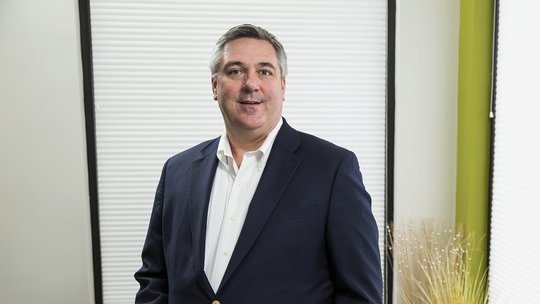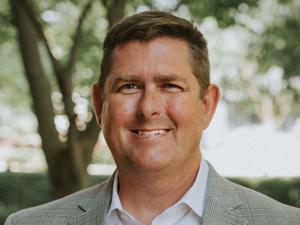
After several months of flying under the radar, Louisville-based Trinity Analytics is starting to emerge in the local health-tech space with large aspirations to tackle what CEO Kevin Bramer called an “epidemic of sorts” — when it comes to the rising cases of dementia nationwide.
Bramer officially began his new role this month. And by Monday, the company had its website up and running.
When Trinity formed in April 2022, David Troutman, a longtime friend of Bramer’s, was serving as the CEO after founding the company. Given Trinity’s many aspirations in the clinical space, Troutman decided to offer Bramer — who has served in leadership roles in the local health care industry for approximately 30 years — the position and then Troutman became the company’s chief financial officer.
“He brought me in to help with thinking about the company, but then said, ‘Hey, you’re better positioned to be the CEO of the company’ … so that’s what I did,” Bramer told me about Troutman. “He certainly has a vision much like I did with Lucina.”
Bramer comes to Trinity after serving as the president and CEO of Lucina Analytics from 2019 to 2022. He founded — and developed the technology for — Lucina Health in 2014 before selling the company to Unified Women’s Healthcare in 2019.
Lucina uses “AI-powered, maternity-specific algorithms and dynamic risk stratification technology,” according to its website, to identify if pregnant women are at risk of a preterm birth — generally in the first trimester.
Now, a similar type of analytic technology will be used to delve into several other health issues — but none more focal than dementia.
“We firmly believe that the research and work that we’re doing around using analytics, we can assess individuals very early in life and determine the progression of dementia — and maybe even certain cases, identify symptomatic conditions that can be changed and then alter the evolutionary state of dementia,” Bramer said.
A costly problem
According to the Alzheimer’s Association, approximately $321 billion was expected to be spent in 2022 in the U.S. for health care, long-term care and hospice service for people 65 years or older with dementia — with one in nine adults being afflicted in that age range.
By 2050, those numbers are expected to climb to a little more than a $1 trillion in money spent to treat a total of one in five people over the age of 65.
“A lot of people think, in many cases, dementia is genetic — it’s not,” Bramer said.
He said that there are reasons — both social determinant-based and clinically based — that suggest given the right set of conditions that dementia could be “paused at a minimum, if it’s genetically coded, if not stopped sometime in the future.”
Bramer said that Trinity is currently in discussion with health plans across the country, with several in the process of signing up to partner with the company, which will in turn give Trinity access to large data sets to be able to start being able to flag certain individuals who may be at high risk for dementia.
“We’re at that stage of [where] we’ve built our algorithms,” Bramer said. “We’ve built the platform. Now, we need the data to validate our assumptions.”
In addition, Trinity is also working in partnership with Norton Neuroscience Institute and with Shirish Barve, a professor of medicine at the University of Louisville’s Division of Gastroenterology, Hepatology & Nutrition, who also is affiliated with the institute.
Gut health, Bramer said, in particular, could play a key role in the onset of dementia.
“There’s a bit of information translated from the bowel, and from the colorectal area that would suggest that that information goes directly to the brain … which actually translates into progression of the dimension state,” Bramer said.
Bramer added that Trinity is “well funded” by undisclosed private investors, and not currently looking for any other sources of funding.
Trinity currently has 10 employees, but expects to continue to expand its headcount — and make Louisville its corporate headquarters.
“I’m very passionate about improving the outcomes of individuals,” Bramer said. “I firmly believe that the more information that is aggregated and used in an appropriate way to really tell a story about said conditions that we can make a difference.”









